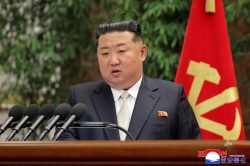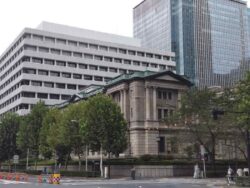
People gather outside the parliament in Taipei, Taiwan May 28, 2024.
13:45 JST, May 29, 2024
TAIPEI (Reuters) – Taiwan’s cabinet will reject and send back for review legislation the opposition passed on Tuesday on parliamentary reforms that have brought tens of thousands onto the streets to protest and accusations of Chinese interference.
The peaceful protests, and sometimes violent confrontations in parliament over the reforms, have been taking place against a backdrop of broader concern about efforts by China, which views Taiwan as its own territory, to influence the island’s politics and split Taiwanese public opinion.
The Democratic Progressive Party’s (DPP) Lai Ching-te won the presidency in January elections, but the party lost its majority in parliament. Taiwan’s main opposition party, the Kuomintang (KMT), along with the small Taiwan People’s Party, together have the most seats.
The parliament reforms give lawmakers the power to ask the military, private companies or individuals to disclose information deemed relevant by parliamentarians, who have the power to punish those who fail to cooperate.
They also criminalize contempt of parliament by government officials, and require the president to give regular reports to parliament and answer lawmakers’ questions, which would be a first for Taiwan.
In a statement late on Monday, the cabinet said the legislation could breach the constitution and separation of power between the executive and legislative branches, and once it had received the documents it will send them back for parliament to reconsider.
The cabinet said while that was likely to be vetoed by parliament, it was “duty bound” to do this.
The DPP, which says the reforms were forced through without proper consultation and their content either vague or an over-reach of power, said it would support its lawmakers to ask the constitutional court for an interpretation on whether the laws and the way the reforms were pushed through were constitutional.
The DPP, and many of the protesters, have repeatedly accused the KMT of being in league with Beijing in trying to ram through the legislation.
Several senior KMT leaders have visited China this year in what the party says is an effort to keep open lines of communication. China refuses to talk to Lai or his party, saying they are “separatists.”
The KMT strongly denies being pro-Beijing and says the parliament reforms are meant to improve government accountability.
“The KMT dismisses the accusations of collusion with China as unfounded and politically driven,” the party said in statement in the early hours of Wednesday.
China views Taiwan as its own territory. The government in Taipei rejects Beijing’s sovereignty claims, saying only the island’s people can decide their future.
Top Articles in News Services
-

Survey Shows False Election Info Perceived as True
-

Hong Kong Ex-Publisher Jimmy Lai’s Sentence Raises International Outcry as China Defends It
-

Japan’s Nikkei Stock Average Touches 58,000 as Yen, Jgbs Rally on Election Fallout (UPDATE 1)
-

Japan’s Nikkei Stock Average Falls as US-Iran Tensions Unsettle Investors (UPDATE 1)
-

Japan’s Nikkei Stock Average Rises on Tech Rally and Takaichi’s Spending Hopes (UPDATE 1)
JN ACCESS RANKING
-

Producer Behind Pop Group XG Arrested for Cocaine Possession
-

Japan PM Takaichi’s Cabinet Resigns en Masse
-

Man Infected with Measles Reportedly Dined at Restaurant in Tokyo Station
-

Israeli Ambassador to Japan Speaks about Japan’s Role in the Reconstruction of Gaza
-

Videos Plagiarized, Reposted with False Subtitles Claiming ‘Ryukyu Belongs to China’; Anti-China False Information Also Posted in Japan

























